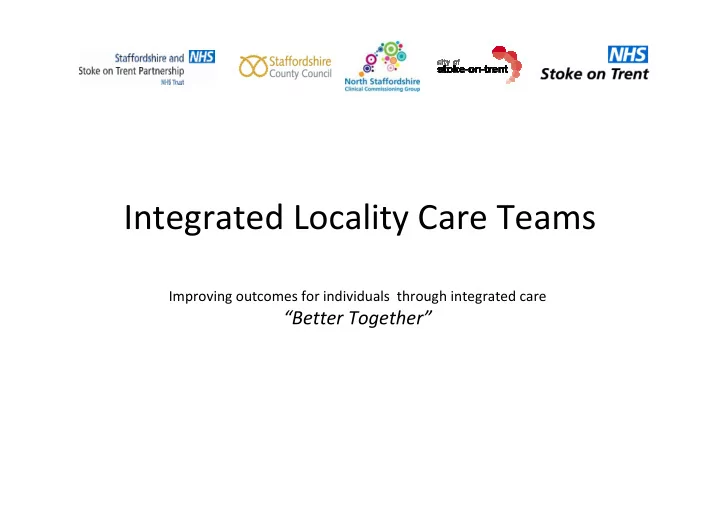

Integrated Locality Care Teams Improving outcomes for individuals through integrated care “Better Together”
Strategic Drivers • National policy • Fit for the Future Programme • Quality Innovation Productivity Prevention • Local vision – ‘Model of Care’ • Improved outcomes • LTC Model; Risk Profiling, Neighbourhood Care Teams, Self Care/Shared Decision Making
Case for Change • Access points can be confusing for local people • Silo working • Duplication • Need to build better relationships between professionals • Fragmentation • Resource Utilisation • Most vulnerable patients fall between the gaps
The Solution • A pro-active case management model • Locality based multi-disciplinary team approach • Person at the centre – to maximise the efficiencies and effectiveness of resources • Core Team links to other co-ordinated locality services • Services and care – right first time, every time
Key Principles Communication Outcome focused Case based Personal MDT review Case discussions Care Plan Management One trusted generic EDD or Individual assessment Review Known to Date all Quality Access to Prompt service treatment based on & care need Safety Governance Satisfaction
Objectives • To exploit the potential gains of integration across health and social care • To develop a performance dashboard that monitors the impact of the ILCTs • To fully deploy/implement the agreed model of care following evaluation of the Early Implementer sites. • Delivery of the agreed pathway of care to ensure seamless, risk managed care, with reduced duplication of assessment, diagnostics and the sharing of information. • Provision of a fully skilled multi-disciplinary community team to ensure staff have the required knowledge and skills to deliver safe and effective care, in the context of evidence based practice. • Reduce unnecessary admissions to hospital of patients in crisis, who could be safely looked after at home with support. • Increase the timely discharge of patients from hospital who no longer require acute medical intervention. • Work towards developing the capability to share patient level data with GP Practices and Social Services via a single IT system, using a collaborative approach with the Local Authority.
Key Actions to Date April 2011 CCG Approval to concept of Integrated Local Care Teams • Practice Questionnaire re: Community Nursing • May 2011 Project meetings commenced • Final CSED LTC Event hosted by JCU – Production of 23 proposals • June 2011 Project Plan finalised • Agreement of Locality population sizes • July 2011 LHE Workshop • Appointed 4 Early Implementer Localities across North Staffordshire & • Stoke on Trent August 2011 Steering Group refreshed • Draft objectives, key principles and patient flow completed • 6 Places awarded on the Integrated Development Programme (IDP) • through Birmingham University September 2011 IDP University sessions commenced • 1 st Early Implementer meeting with Tunstall Locality • 1 st Early Implementer meeting with Leek & Biddulph Locality October 2011 • 1 st Early Implementer meeting with Newcastle South Locality • 1 st Draft of service specification • 1 st Early Implementer meeting with Longton Locality • 1 st Early Implementer workshop with Newcastle South Locality November 2011 • All Early Implementer practices signed up to and able to use the Risk • Stratification Tool Business Planning session • LHE Commissioning Summit • 1 st Draft Business Case submitted as part of IDP December 2011 • 1 st Operational Level Meeting with Newcastle South Locality • Data Sharing Agreement approved •
Next Steps • Refining the Business Case • Milestone review to maintain momentum • Baseline & Impact Modelling • Presentation to organisational boards • Political approval • Continued staff and user engagement • Implementation of Business Case • Service Evaluation post implementation
Recommend
More recommend